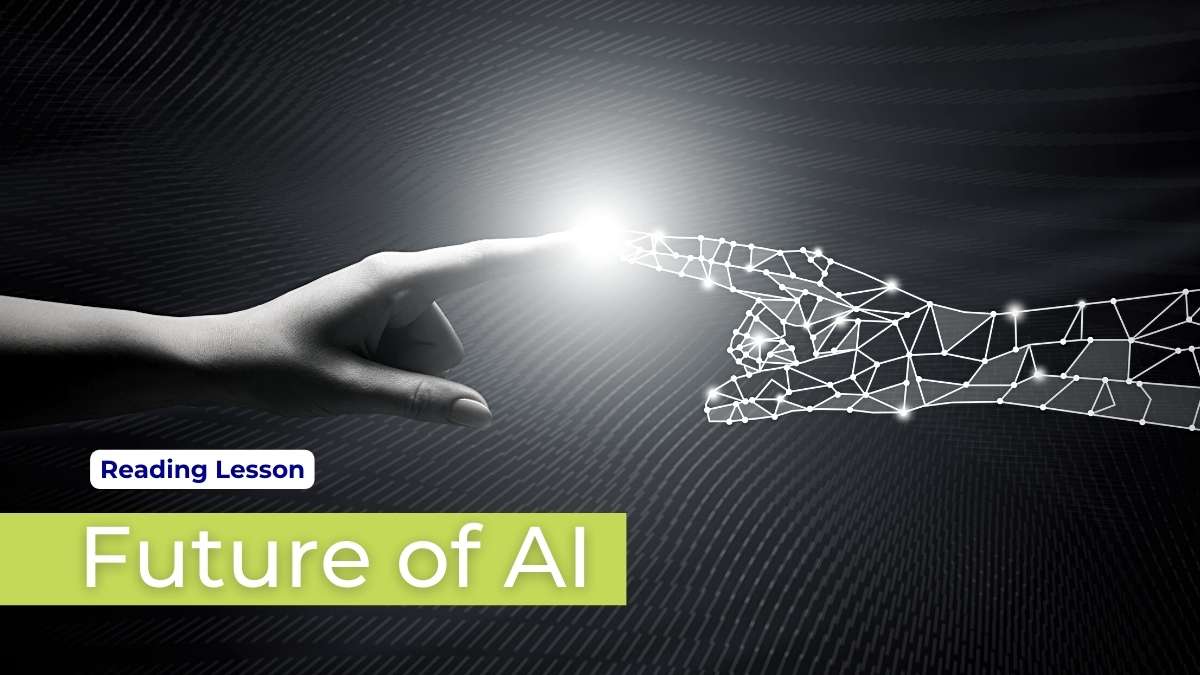Reading lesson: Future of AI

Read this article about technological advancements. You can also listen along with the audio below. Then, complete the writing exercise.
Future of Artificial Intelligence
Computers ‘to match human brains’
Computing has come a long way since the first time a computer beat world chess champion Garry Kasparov in 1996.
Computer power will match the intelligence of human beings within the next 20 years, according to a leading scientific “futurologist”.
Technical progress will be increasing during the next half century, up to 32 times more advanced than there was in the whole of the 20th century. As a result, artificial intelligence could be as capable as human intelligence by the 2020s, said the American computer guru Ray Kurzweil.
Machines will be getting smarter than humans and soon will be solving some of the most difficult problems of the 21st century, said Dr. Kurzweil, one of the most radical thinkers in the field of technological prediction.
Dr. Kurzweil was originally a pioneer in various fields of computing and automatic speech recognition by machine. In his speech to the American Association for the Advancement of Science (AAAS), he described a future where machines will be far more intelligent than humans in terms of how they will be communicating, teaching, and replicating among themselves.
His prediction is based on the fact that the computer chip has doubled in power every two years for the past half century, which has led to accelerating progress and miniaturization.
Dr. Kurzweil told the annual meeting of the AAAS in Boston: “in the next half century, there will be 32 times more technical progress than the last half century. Computing, communication, biological technologies, and human knowledge in general are all accelerating fast.”
Computers have so far been based on two-dimensional chips made from silicon, but three-dimensional chips with greatly improved performances are being developed. There are even plans to construct them out of biological molecules that can be miniaturized even more than metal-based computer chips.
“The hardware for machines with human-level intelligence will be based on three-dimensional, molecular computing. The software will be developed by studying and analyzing the human brain in detail. Already, 24 regions of the human brain have been modeled and simulated,” he said.
Although the brain is not as efficient as a computer at storing and retrieving information, it can associate different pieces of information, look ahead, and plan. It can also be imaginative and creative, which is at the heart of human existence. But Dr. Kurzweil is one of several computer scientists who believe that computers will soon create a “post-human” world where a second, intelligent being exists next to people.
“When non-biological intelligence matches the level of human intelligence, it will very quickly overtake it because of continuing technological progress, as well as the ability of machines to instantly share their knowledge,” Dr. Kurzweil said.
Adapted from The Independent, February 16th, 2008.
Writing Exercise
Reading Comprehension Quiz
Quiz Summary
0 of 12 Questions completed
Questions:
Information
You have already completed the quiz before. Hence you can not start it again.
Quiz is loading…
You must sign in or sign up to start the quiz.
You must first complete the following:
Results
Results
0 of 12 Questions answered correctly
Your time:
Time has elapsed
You have reached 0 of 0 point(s), (0)
Earned Point(s): 0 of 0, (0)
0 Essay(s) Pending (Possible Point(s): 0)
Categories
- reading 0%
- 1
- 2
- 3
- 4
- 5
- 6
- 7
- 8
- 9
- 10
- 11
- 12
- Current
- Review
- Answered
- Correct
- Incorrect
-
Question 1 of 12
1. Question
According to the text, is the following statement true or false?
Computing power could reach the level of human intelligence before 2030.CorrectIncorrect -
Question 2 of 12
2. Question
According to the text, is the following statement true or false?
There will be less technical progress in the 21st century than in the 20th century.CorrectIncorrect -
Question 3 of 12
3. Question
According to the text, is the following statement true or false?
In the near future, machines will be replicating among themselves.CorrectIncorrect -
Question 4 of 12
4. Question
According to the text, is the following statement true or false?
Future chips will be based on biological molecules instead of silicon.CorrectIncorrect -
Question 5 of 12
5. Question
According to the text, is the following statement true or false?
Machines will never reach great levels of human intelligence.CorrectIncorrect -
Question 6 of 12
6. Question
According to the text, is the following statement true or false?
People will soon be living together with intelligent machines.CorrectIncorrect -
Question 7 of 12
7. Question
Which of the following terms means made a lot of progress?
CorrectIncorrect -
Question 8 of 12
8. Question
Which of the following terms means happening or developing faster and faster?
CorrectIncorrect -
Question 9 of 12
9. Question
Which of the following terms means build something from different parts?
CorrectIncorrect -
Question 10 of 12
10. Question
Which of the following terms means to think about the future?
CorrectIncorrect -
Question 11 of 12
11. Question
Which of the following terms means something that exists?
CorrectIncorrect -
Question 12 of 12
12. Question
Which of the following terms means go past something after reaching the same level as it?
CorrectIncorrect
